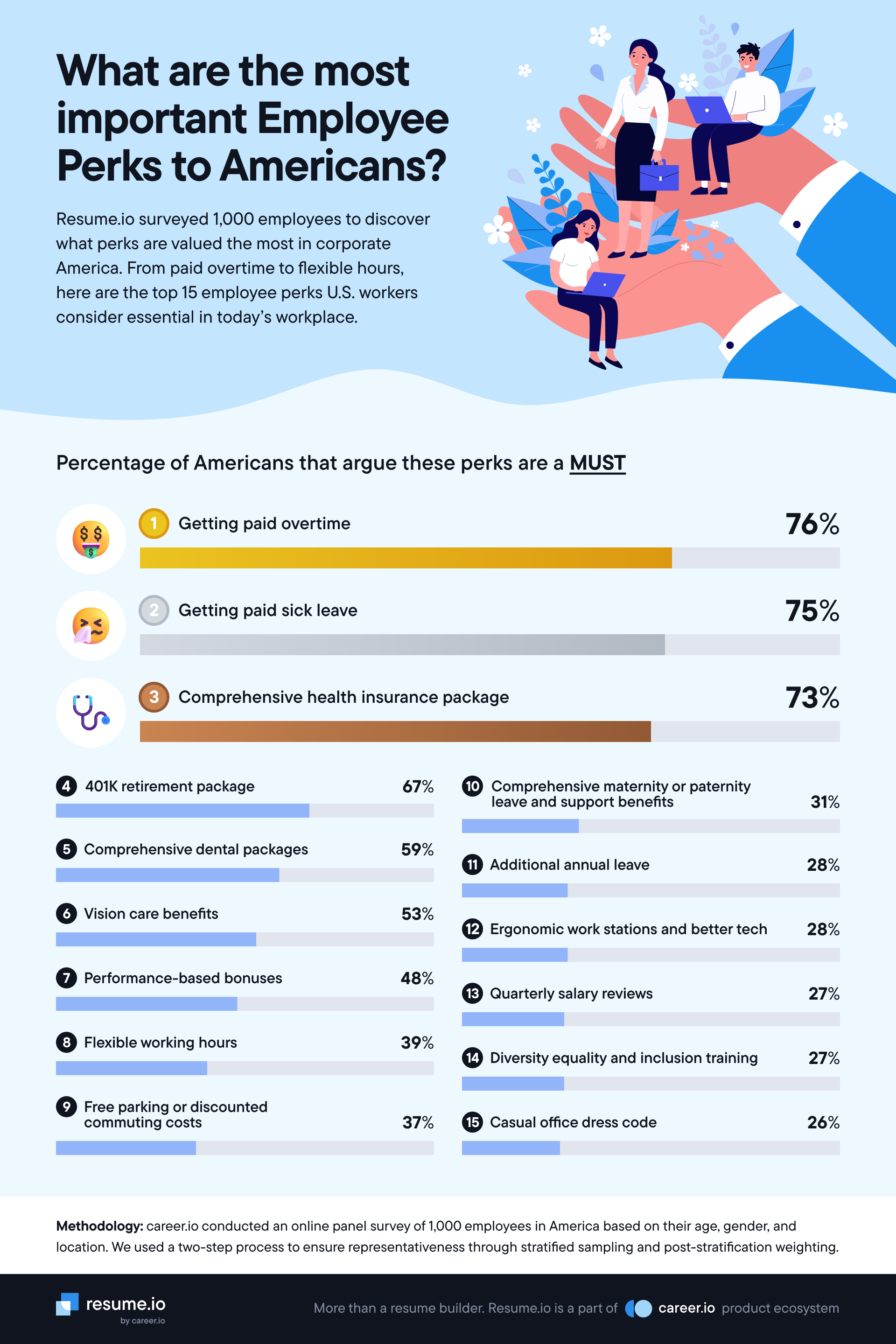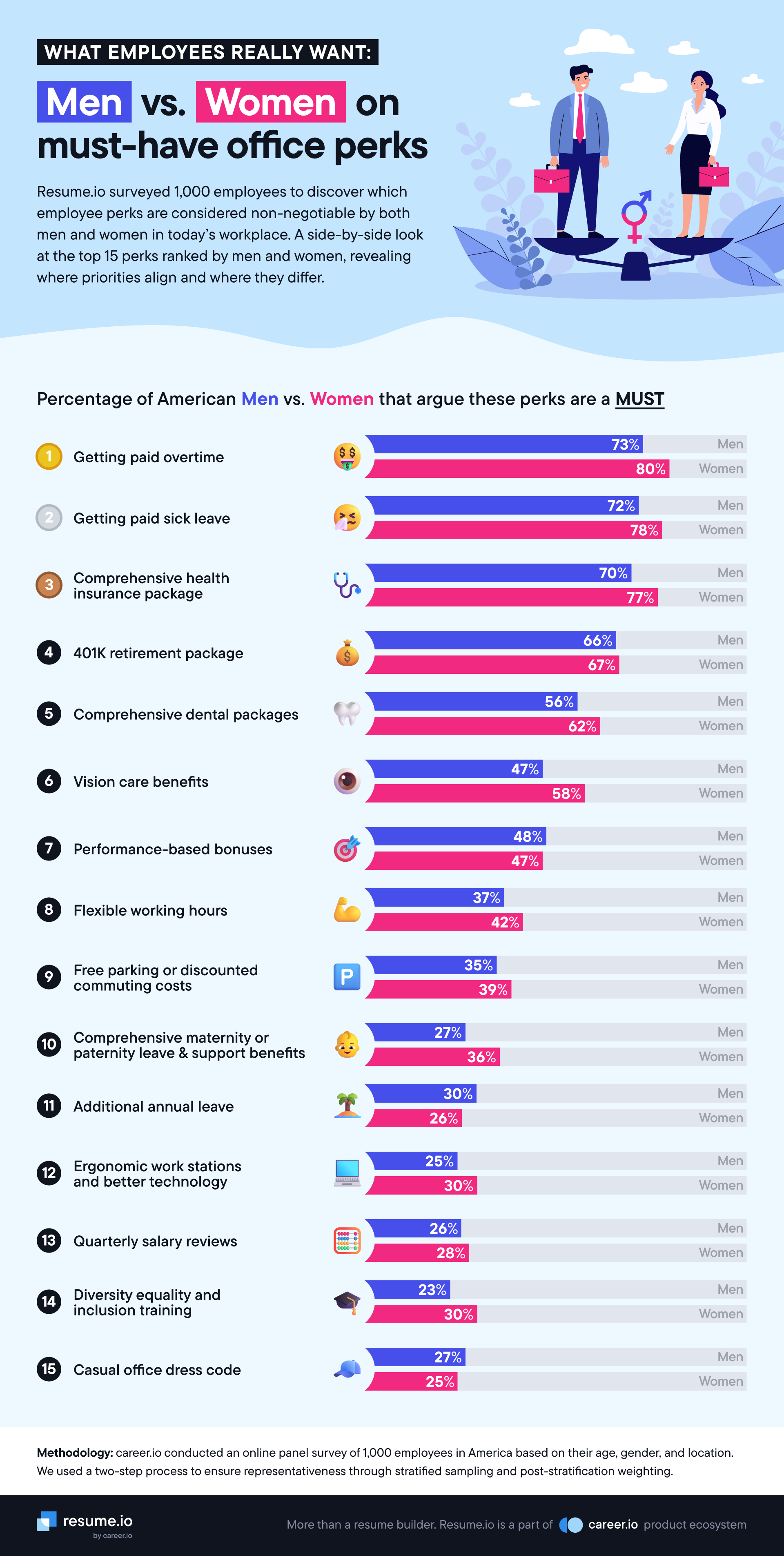As return-to-office (RTO) policies continue to grow across America, employees are rethinking what truly matters to them in the workplace. Whether it’s navigating a hybrid schedule or heading back to the office full-time, the perks employees value the most are shifting, it’s no longer about free lunches and ping-pong tables but real support, flexibility, and long-term wellbeing.
To uncover what benefits today’s workforce really wants, we surveyed 1,000 American professionals. The results reveal a clear picture of the perks people now consider non-negotiable in the workplace, from flexible hours and paid sick leave to performance-based bonuses and beyond. Highlighting a shift toward meaningful, supportive benefits that align with evolving values around work-life balance, inclusivity, and financial security.
What we did
For this study, we surveyed 1,000 American employees, capturing insights across participants' age, gender, and location. Participants were asked to identify which workplace perks they considered to be absolute must-haves when evaluating job opportunities.
The survey responses were then analyzed to uncover key trends, generational differences, and the shifting priorities of today’s corporate America.
Key findings
- Paid overtime was revealed as the most in-demand employee perk in America, with 76% of professionals saying it is a must-have.
- A third of Gen-Z workers argue that a compressed workweek should be a non-negotiable perk, more than any other generation.
- Female professionals prioritize inclusive and supportive benefits, such as maternity/paternity leave and DEI training, more than their male colleagues, who prefer financial benefits such as stock and investment options.
Paid overtime revealed as the top office perk
Paid overtime stands out as the most sought-after perk in 2025. The results reveal that 76% of American workers say paid overtime is a non-negotiable benefit, making it the top demand among employees.
This is closely followed by:
- Paid sick leave (75% consider it a must-have)
- Comprehensive health insurance packages - 73%
- 401(k) retirement package - 67%
- Comprehensive dental packages - 59%
The study highlights a clear preference for health benefits and financial security over traditional “fun” perks in the workplace.

Gen-Z wants flexibility, balance and pet-friendly offices
Younger generations are driving a major shift in workplace culture, prioritizing flexibility, mental health and inclusivity over traditional perks. Our research found that Gen-Z, in particular, is setting a new standard for what the future of work should look like.
One in three Gen-Z professionals (30%) argue that a compressed, four-day workweek should be a non-negotiable perk. This highlights a strong desire for a better work-life balance from the younger generation. In contrast, only 19% of Gen-X and 13% of Baby Boomers agree, signalling a clear generational divide in expectations around traditional work hours.
Fun rooms, such as spaces with games like ping-pong and other recreational activities, are popular amongst Gen-Z, with 18% saying that they’re a must-have in the workplace. This compares to 14% of Millennials, 6% of Gen-X and only 1% of Baby Boomers. This highlights that younger employees view fun and relaxation as an essential part of workplace culture. Similarly, the study found nap rooms to be popular amongst Millennial workers, with 17% considering them an essential, and 13% of Gen-Z agreed. Highlighting an evolving mindset around the importance of rest and mental rejuvenation at work.
Pet-friendly offices have also risen in popularity, especially among Gen-Z (20%) and Millennials (14%), who increasingly view the ability to bring pets to work as a quality-of-life benefit that fosters a more relaxed and supportive office atmosphere.
Beyond the more superficial perks, interestingly, the study also found that 27% of Gen-Z professionals say that support for neurodiverse employees is a non-negotiable perk. This is nearly double the 14% of Gen-X workers who feel the same, and considerably higher than millennials (21%) and Baby Boomers (7%). This strong advocacy for inclusivity among younger workers signals a future where equity, accessibility, and wellness will be at the heart of workplace expectations.
Men value financial perks more than women
Our analysis also uncovered a significant gender gap in what professionals consider to be essential workplace perks, reflecting deeper differences in how men and women approach career satisfaction and support structures.
Financial security is a top priority for male professionals:
- 28% of men consider stock and investment options to be essential in the workplace, compared to 22% of women.
- Similarly, 20% of men say that financial planning and counseling is a must-have benefit, versus only 15% of women.

In contrast, women prioritize supportive, inclusive benefits that address both family needs and workplace culture:
- 36% of women say that comprehensive maternity and paternity leave, along with associated healthcare support, are non-negotiable perks. This compares to 27% of men who agree.
- 30% of women rate Diversity, Equity, and Inclusion (DEI) training as an essential workplace feature, compared to 23% of men.
- 25% of women emphasize the importance of mental wellbeing support services, slightly more than the 22% of men who prioritize it.
The findings suggest that women are more likely to seek long-term, stability-focused benefits that promote wellness, inclusion, and family support, while men place a slightly greater emphasis on immediate financial gain.
Preparing for the future
Our study highlights that employees want more than flashy perks. They are seeking environments that prioritize financial fairness, health and wellness, inclusivity, and flexibility.
As companies plan for the future in light of the increase in RTO (return to office) mandates, understanding these evolving needs will be crucial for attracting and retaining employees.
For professionals aiming to find roles aligned with their values, it’s crucial to communicate priorities and expectations during the job search process. Be sure to update your resume and cover letter to highlight your goals and the types of workplace environments where you’ll thrive. Our wide range of cover letter and resume templates will help you stand out from the crowd.
Methodology
Online panel survey of 1,000 American employees aged 18+. Respondents were selected to represent diverse demographics across age, gender, and location. A stratified sampling approach and post-stratification weighting were used to ensure a balanced and representative dataset.
Data recorded: April 2025





